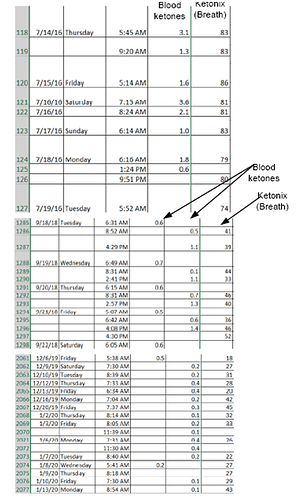@fitbod I believe what’s happening is that the body takes whatever steps it has to take to allow you to exercise.
Consider this study of long-term fat-adapted cyclists (LC, low carb) versus carb-using cyclists (HC, high carb):
The muscle glycogen levels were similar after a while.
Now, how that actually happens, I’m not sure. I don’t know the extent to which GNG can power this, and I assume (just based on my own experience) that this changes over time. For instance, I started keto/LC on 1/1/14. As of 2.5 years later, I still had some high ketones (blood and breath). As of a year-two years later, they were lower. As of another 1-2 years later, even lower:
I think of it as a balance equation: energy we can use = glycogen + GNG-derived blood sugar + ketones + FFAs (+ am I missing something? probably).
Based on this, I used to think “athletes” who are low carb/keto would have higher blood sugar than people who are low carb and not athletes. From what I’ve seen, that does seem to be true.
But then Shawn Baker came along and somehow dropped his blood sugar (from an HbA1c over 6 while being carnivore) to very low blood sugar (not sure what his HbA1c is now, though). The 6 made sense to me, as he’s an incredible athlete, so I figured he needed GNG to power his workouts.
Is the same thing that happened to me (lower ketones over time, better use of FFAs as fuel) happening to him? Or is there something else? I don’t know.
But if you see people who start low carb, for the first while, they get really high ketones. I assume that’s because they need them, as the muscles/other cells aren’t used to using FFAs. Meanwhile, over time, fewer ketones are necessary.
But this brings up an issue outlined above, which is what happens to those of us on low carb for a long time and making very small amounts of ketones? There have to be some cells/muscles that use glucose, otherwise we wouldn’t have higher glucose in the morning or higher glucose when we exercise. Is this to counteract the ketones lowering? Should we get higher blood glucose over time?
I really don’t know, and haven’t had a CGM in a while. They got too expensive ($150/month without insurance, at least where I live, and I have to get a doctor’s prescription).
Anyway, if anyone finds more research about this, I’d be interested in it. But people like me (LC/keto 7+ years) usually aren’t the subjects of studies, and therefore, little is known about us.
By the way, this is a good article about blood sugar in general on low carb:






